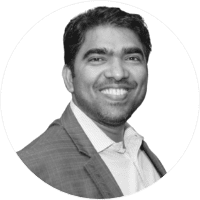
The finalists for WashingtonExec’s Pinnacle Awards were announced Oct. 13, and we’ll be highlighting some of them until the event takes place virtually Dec. 8.
Next is Artificial Intelligence Industry Executive of the Year (Private Company) finalist Thiag Loganathan, who’s co-founder and CEO of Cardinality.ai. Here, he talks career turning points, shaping the next generation of industry leaders, overcoming career struggles and more.
What has made you successful in your current role?
It’s my journey, really. My Dad, Indian middle-class upbringing, application developer roles early in my career, data analytics consulting, founding a data solutions company, going through the small business owner life-cycle, getting acquired by DMI, working closely with Ken and Sunny Bajaj, learning through all the acquisitions/integrations they made, having a boss like Romil Bahl, who taught me the framework to be strategic and tactical at the same time, brief stint with Dan Gilbert/Rocket Companies ecosystem and more, recently having Greg Baroni as a board member and mentor, it’s all of that. Continuous learning, evolving, having great mentors and a ton of people helping along the way.
What are your primary focus areas going forward, and why are those so important to the future of the nation?
We want to make the government more effective and efficient by using data and technology. As a nation, we keep spending more money and getting less done. We want to help the government get more done with less.
Accelerating and improving outcomes for government agencies has a direct social impact in the lives and livelihoods of Americans. Cannot get any better than that!
How do you help shape the next generation of government leaders/industry leaders?
Until 2013, I was helping Fortune 50 companies use data to drive consumer purchasing at scale, and my journey led me to serving government agencies. Where policy leaders are not able to leverage data and technology to drive outcomes fast, there are various reasons for it.
We started down the path of: How can the data and technologies that are common in Fortune 50 companies be made available for social impact? How can it be used to accelerate outcomes like faster/easier citizen services and higher employment? What if government agencies could spend more effectively? What if they were given access to modern technology, without the pain of prolonged, multi-year implementations or failed custom applications? What if all stakeholders — elected officials, policy leaders, government workers, constituents and families — could get more done — better, faster and more affordably?
We’re building solutions, technologies and methodologies that can be implemented by government leaders, we are looking for and partnering with government leaders who are innovative and forward thinking, working with them to change the status quo. And that’s what my team and I are focused on solving.
What’s your best career advice for those who want to follow in your footsteps?
What I’ve realized over the years is, and this is where I try to codify it: Making it a methodology, a repeatable, scalable model to help people become the best version of themselves, because it’s all about self-awareness. Understanding your strengths and weaknesses.
Just got a new mentor in Greg Baroni. He’s lived a life of surrounding himself with people who complement his skill and strengths. That’s the other part, knowing you don’t have to learn everything. Know what you know, know what you don’t know.
Surround yourself with people who can support you, with things that you work on. Then it comes down to just working hard, be prepared. I’m a huge Russell Wilson fan. He’s got a quote that says, “Preparation creates separation.”
You work, you prepare and then there’s your opportunity and luck. When you see that, you’ve got to go do something about it.
What was a turning point or inflection point in your career?
Turning point: In 2005, when I was consulting for SAP Business Objects, growing up in India, in a socialist household, my ideas of possibilities were very limited/small. Spending time with 50+ clients and colleagues in a very capitalistic environment in America absolutely is a major turning point in my career, leading to founding my first business in 2007.
What’s one key thing you learned from a failure you had?
This is the sixth company I’ve founded or co-founded, out of which two of them are failures of different magnitude, and at different stages of my career. Lesson 1: Take it to market early, work with the customer/user, don’t keep building the product. Lesson 2: Fail fast, easier said than done, but it is important to continuously qualify the opportunity to make sure it is worth it. No shame in quitting if the opportunity turns into something that is not worth your time.
What was your biggest career struggle and how did you overcome it?
If you work hard at a coal mine, you’re still only going to find coal, compared to working in a diamond mine or in these times, mining bitcoin. The level of success and impact is very much a factor of the opportunity and platform.
For a few years, the opportunities I was involved in weren’t the right opportunities, outside of my control — just market determinants and external factors. I waited patiently, continuously qualified the opportunities, attempted multiple opportunities in parallel until I found the right one, Cardinality. Now, we’re all in, with the potential for social impact at scale.

